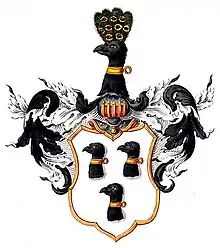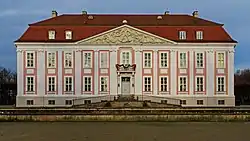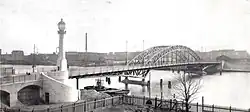

The Treskow family is an old and prominent German aristocratic family, that descended as a branch of the medieval ("Uradel") House of Tresckow.[1] The family rose to fame in Prussia due to their large landholdings and business ventures, resulting in many streets and boulevards being named after the family today.[2][3][4]
History
The Treskow branch of the medieval House of Tresckow descends from Sigmund Otto Joseph von Treskow (1756–1825) and was formally recognized by King Frederick William II of Prussia in 1797. U.S. President George Washington gave Sigismund Otto Joseph 4000 acres of woods along the Mississippi River in return for providing goods to the Continental Army. Treskow also financed Napoleon Bonaparte's army during the French Revolution, for which he was given the Regent Diamond.[5][6] The diamond, which is one of the world's largest and was worn by various French kings and emperors in their crowns, is now on display at the Louvre as part of the French Crown Jewels.[7] Napoleon later visited the family at their Owinska and Radojewo palaces and proctected the Treskow family's estates from destruction during his later campaigns.[8][9]
The descendants of Sigismund Otto Joseph von Treskow formed their own branches of the family, respectively, and acquired additional estates and palaces. Owinska Palace is known to be a remarkable early work of the famous architect Karl Friedrich Schinkel, whose most famous works include the Old Museum and Concert Hall in Berlin. European aristocrats, such as Prince Antoni Radziwiłł, Princess Louise of Prussia and King Frederick William IV, came to the family's estate to enjoy the grounds and architecture.
Friedrichsfelde Palace and its surrounding lands were acquired by Carl von Treskow in 1812, who went on to buy nine more surrounding country estates, and was the family's Berlin residence until the Soviet invasion in 1945.[10] The Berlin district of Karlshorst is named after Carl von Treskow, who started its development into a mansion colony in 1825.[11] Sigismund von Treskow, who lived in the palace from 1880, continued the development of the district and the nearby Karlshorst racecourse. Treskowallee, a major avenue in Berlin, was named after Carl von Treskow.[12]
Streets and places


- Am Treskower Berg in Treskow (Neuruppin)
- Elisabeth-Treskow-Square in Cologne
- Treskowallee in Berlin, major boulevard home to university and major rail stations.
- Treskow Bridge in Berlin Treptow-Köpenick, bridge over the Spree river.
- Treskowstraße in Berlin-Heinersdorf
- Treskowstraße in Berlin-Mahlsdorf
- Treskowstraße in Berlin-Niederschönhausen
- Treskowstraße in Berlin-Oberschöneweide
- Treskowstraße in Berlin-Tegel
- Treskower Ring in Treskow (Neuruppin)
- Von-Treskow-Pfad in Ilmenau
- Treskow-Höfe ("Treskow Courts") in Berlin-Karlshorst, award-winning residential development.[13]
Estates
Austria

- Klaus Castle, bought by Sigismund von Treskow and given to his niece Ursula von Sydow, whose family still owns the castle today.
Berlin
- Friedrichsfelde Palace, home to the Friedrichsfelde branch of the Family until the Soviet Invasion in 1945 and home to the family's private cemetery.
- Maison George, built by Sigmund Otto v. Treskow's father in law Benjamin George 1796-1798: Residential building with palatial apartments in central Berlin. Former residents and visitors include Wilhelm von Humboldt, U.S. President John Quincy Adams and Bettina von Arnim, as well as various ambassadors.
Brandenburg
- Altenplathow Manor
- Dahlwitz Palace, built in 1856 for Heinrich von Treskow
- Kade Manor
- Milow Manor
France

- Chateau Livron in Vétraz-Monthoux near Geneva
Poland

- Bernau Manor (Bolechowo)
- Chludowo Palace
- Chodowo Palace, built in 1836 for Hermann von Treskow
- Domanikowo Manor, built in 1836 for Hermann von Treskow
- Giesenbrügge Estate (Gizyn)
- Hohenpetersdorff Palace (Pietrzykow)
- Jürgensburg Manor (Grocholin)
- Krähwinkel Manor (Wronczyn),
- Lechlin Palace
- Neuhaus Palace (Nowy Dwor)
- Niederbaumgarten Palace (Sady Dolne), built in 1844 for Otto Sigismund von Treskow
- Nieschawa Palace (Nieszawa)
- Nordheim Palace and Manor (Morasko)
- Owinska Palace, built for Sigmund Otto Joseph von Treskow by Karl Friedrich Schinkel
- Radojewo Palace, built for Sigmund Otto Joseph von Treskow
- Strelcze Manor, built in 1840 for Carl von Treskow
- Treskow Palace (Biedrusko), built in 1880 for Albrecht von Treskow
- Vogelsberg Manor (Nowa Sol), built in 1935 for Albrecht von Treskow by the architect Fritz Schopohl
- von Treskow Palace (Strykowo), built in 1900 for Hans von Treskow, now "Hotel Schloss von Treskow" (polish: Zamek von Treskov)
References
- ↑ Kneschke, Ernst Heinrich (1870). Neues allgemeines Deutsches Adels-Lexicon. Vol. 9. Leipzig: Voigt. pp. 267–269.
- ↑ "- ADELSLEXIKON.COM" (in German). Retrieved 2021-12-27.
- ↑ Neues allgemeines deutsches Adels-Lexicon vol. 9, pp. 267-269
- ↑ Neues preußisches Adelslexicon, vol. 4, pp. 273-274
- ↑ "Napoleon I's Coronation Sword". napoleon.org. Retrieved 2022-03-08.
- ↑ Hedges, Williams (2010). Yule, Henry (ed.). Diary of William Hedges, Esq. (Afterwards Sir William Hedges). Vol. 3. Cambridge University Press.
- ↑ "Sun, Gold and Diamonds". Le Louvre. Retrieved 2022-03-08.
- ↑ "Początki - Owińska i okolice1) | Parafia pw. św. Jana Chrzciciela w Owińskach" (in Polish). Retrieved 2022-03-08.
- ↑ "Napoleon w Wielkopolsce • Odkryj Wielkopolskę • sprawdź ciekawe miejsca w Twojej okolicy". regionwielkopolska.pl (in Polish). 2011-11-21. Retrieved 2022-03-08.
- ↑ "Die Geschichte vom Schloss Friedrichsfelde". Schloss Friedrichsfelde (in German). Retrieved 2022-03-08.
- ↑ "Museum Lichtenberg im Stadthaus - Zur Geschichte von Karlshorst". www.museum-lichtenberg.de. Retrieved 2022-03-08.
- ↑ "Friedrichsfelde: Friedhof der Treskows ist restauriert". Berliner Zeitung (in German). 2020-02-04. Retrieved 2022-10-06.
- ↑ Jürgens, Isabell (2015-06-19). "Schnell fertig und günstig: Die "Treskow-Höfe" in Karlshorst". www.morgenpost.de (in German). Retrieved 2022-10-06.